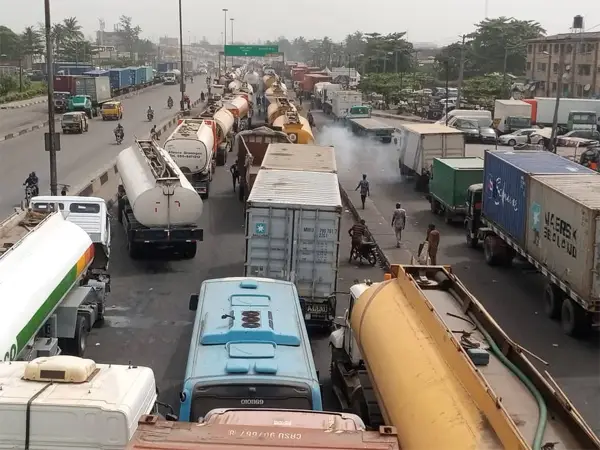TOP TEN MUSLIM UNIVERSITIES IN AFRICA
February 14, 2026ANALYSIS: Why Nigeria GDP is not the best in Africa Despite having the largest market
February 10, 2026Special Report On How Gridlock Causes Businesses, Others To Lose N100bn Monthly As Petrol Tankers, Containers Occupy Apapa Roads
Special Report On How Gridlock Causes Businesses, Others To Lose N100bn Monthly As Petrol Tankers, Containers Occupy Apapa Roads

There were indications that, businesses and others might be losing over N100 billion monthly as containers and petrol tankers continue to stay permanently on Apapa roads and environs in Lagos, where Tin Can and Apapa ports, factories, bonded terminals and other corporate organisations carry out their operations.
Our Correspondent Sanusi Abdullahi Oyelekan, who recently monitored the situation, noticed that the tankers and containers stretch from the Lagos ports up to Berger, Mile 2, Second Rainbow, Orile, Festac as well as Satellite Town, thereby blocking the free movement of goods and persons in the areas.
Specifically, many tankers that blocked the roads, included Mai Kafi, Soroman, Dwell, A A Rano, Erit Oil, Red Star, Erith Oil, Eterna, MRS and Shafa Energy.
In an interaction with our correspondent, the National President, National Council of Managing Directors of Licensed Customs Agents, Mr. Lucky Amiwero, who based his estimation of losses on the turnaround time of tankers and the cost of personnel involved in different transactions, said: “It is not an easy problem. The losses are huge and can be estimated at over N100 billion monthly. Some interventions have been made, but sadly, the petrol tankers and containers continue to occupy the roads.
“The situation is worsened by the huge presence of tank farms in Apapa. We are an oil producing nation that should not only export crude oil but also process our petroleum products. If everything is working well, we would not need tank farms.”
Similarly, another operator, who pleaded anonymity, said: “The turnaround trip should be about 72 hours. But it takes many days and weeks to transact business. More so, we also pay a lot as welfare cost in servicing vehicles and welfare of drivers, among others.”
However, the Chief Executive Officer, Nigerian Midstream and Downstream Petroleum Regulatory Authority, Engr. Farouk Ahmed, whose agency regulates activities in the Midstream and Downstream sectors, did not respond, weekend.
But a source in the organisation, said: “It is mandatory for all tank farm operators to apply, meet basic conditions, including parking bays before going into business.”
Checks by the newsmen indicated that the presence of trucks and tankers has caused many accidents and loss of lives.
It also indicated that the police, Federal Road Safety Corps, FRSC and other traffic-related agencies have encountered different challenges in the process of managing traffic and maintaining law, order as well as security in Apapa and its environs.
Another findings indicated that while many tank farms have large holding bays, some have small spaces while some do not have spaces at all for parking, even though they remain a pre-condition to the establishment, construction and operation of tank farms by the regulator, the Nigerian Midstream and Downstream Petroleum Regulatory Authority, NMDPRA.
It also showed that the situation is worsened by tanker and truck owners that have no targeted destinations, but can occupy the roads permanently until persons that have consignments hire them for business.
Even some trucks with targeted destinations, it was gathered prefer to stay on the roads than spaces provided for them at the ports as they intend to not only escape payment of fees but also consider it faster to get to the ports after paying tips to security agencies.
It was also gathered that the Federal Government has integrated petroleum tankers with Information Communication Technology, ICT, for ease of control and management in a renewed move to resolve the perennial gridlock on the Mile-end of the Apapa-Oshodi Expressway.
The Port Manager, Lagos Port Complex, LPC, Mr. Charles Okaga, said that the Federal Government through the Ministry of Petroleum Resources was in talks with tanker owners and drivers.
Okaga clarified that the Nigerian Ports Authority, NPA, was in charge of containers carrying trucks and not tankers, adding that it had to establish the Electronic call-up system to manage the in-flow and out-flow of trucks in the ports.
While reiterating that tankers did not fall under the purview of the NPA, he disclosed that the government was trying to resolve the gridlock caused by tankers on that axis.
He said: “It was because of the traffic situation that made NPA come up with the Eto arrangement so that container and cargo carrying vehicles are streamlined to evacuate cargoes from the ports in a seamless manner.
“The petroleum tankers are not under our purview and I know that the Lagos Government is in discussion with the Ministry of Petroleum over this matter.”
Speaking in a similar vein, Mr. Bello Ridwan, Vice Chairman of Nexus Association of Maritime Transport Operators, NAMTOP, called on the need for the Nigerian Ports Authority and the Truck Transit Parks, TTP to simplify the call system to make it easy for genuine truckers to access the ports.
Ridwan also said that the introduction of the pre-gates procedure before a truck could be accessed into the ports had made a mess of the entire project, to the extent that the electronic call system had been compromised.
He stated that truckers had lost money, and wasted resources and time by going through satellite parks to pre-gates before they could access the ports.
He said: “NPA and Eto should see how they will do the call-up system seamlessly, the issue of going to Satellite parks, from satellite parks to pre-gates, is just a way to make money from poor truckers.
“As we speak some people who have connections can book their trucks in the morning by 9 A.M and by 2 pm, they are at the entrance of the port to pick up cargo while truckers that are not privileged to know people in NPA will be there for five to seven days before they can access the ports.
“At a point, there was a congestion black market Eto ticket and it was as much as N300,000 because peoples’ Codes were either stolen or resold to the highest bidder.
“As I speak to you, my truck is in Satellite Park and it has not been batched to go into the port because they say they are observing congestions on the roads.”
Reacting to the development, a Customs Clearing agent, Mr. Emeka Ilo, expressed concern over the fact that a road that was recently constructed with so much money has been turned into a park by tankers, adding that the government needs to regulate the activities of these tankers. We have God-made Sea ports in the different parts of the country, that should have been developed and oil tank farms sited near those ports.
On his part, the Commissioner for Information and Strategy, Gbenga Omotoso, Commissioner for Transportation, Oluwaseu Osiyemi, Special Adviser to the Governor on Transportation, Sola Giwa, did not respond to Vanguard messages sent to their phones as of press time.
But an official, who spoke on condition of anonymity to Vanguard, said, the state government, has already intervened with the view to address the fresh crisis.
He said: “There are bad elements at the Ports, but we need to join hands together to bring sanity to the situation. But am aware, a committee has been set up to resolve the fresh crisis and restore sanity in the area.”
Reacting to the development, former Chairman of the Presidential Task Force on Apapa traffic, Dr. Kayode Opeifa, said: “Whatever you see in Apapa now must be the creation of some individuals or group of people. Apapa should be better off and free of any traffic situation. The government institutions that are saddled with the responsibility of managing the traffic should be seen to be on top of the situation.”
However, the National President, Oil and Gas Service Providers Association of Nigeria, Mazi Colman Obasi, said: “We have God-made Sea ports in the different parts of the country, that should have been developed and oil tank farms sited near those ports. There are sea ports in Warri, Delta State, Port Harcourt seaport, Rivers State, Calabar Seaport, Cross River State, natural deep seaport, Oron in Akwa Ibom State, etc. There is no need to concentrate on the development of seaports in Lagos. If Nigeria is refining its crude oil locally, there would have been no need for Petro-tanker trucks and containers to gather at Apapa.”
Sanusi Abdullahi Oyelekan, reporting for INTEGRITY NEWS.











